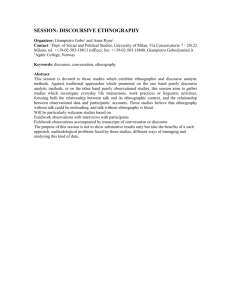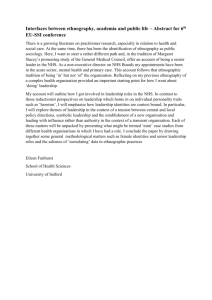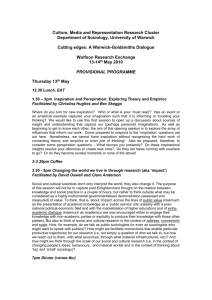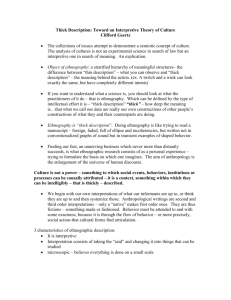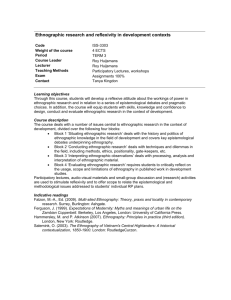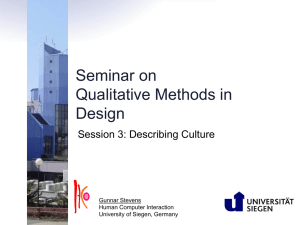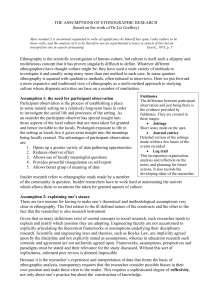Community Ethnography I - Ethnic Studies Department
advertisement
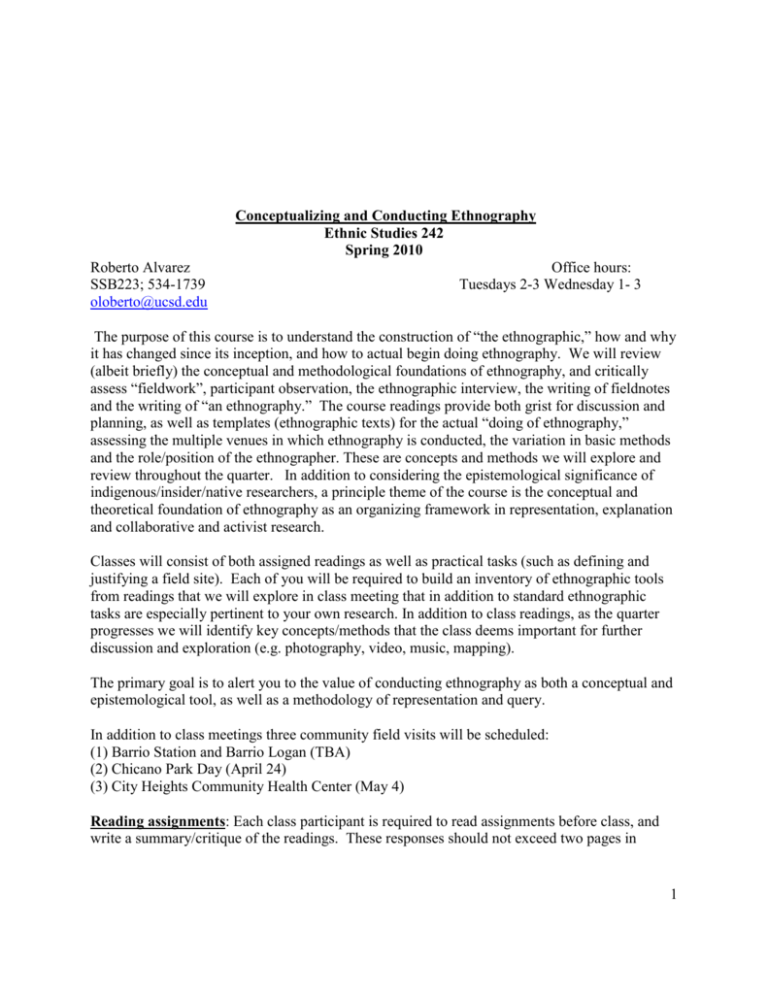
Conceptualizing and Conducting Ethnography Ethnic Studies 242 Spring 2010 Roberto Alvarez SSB223; 534-1739 oloberto@ucsd.edu Office hours: Tuesdays 2-3 Wednesday 1- 3 The purpose of this course is to understand the construction of “the ethnographic,” how and why it has changed since its inception, and how to actual begin doing ethnography. We will review (albeit briefly) the conceptual and methodological foundations of ethnography, and critically assess “fieldwork”, participant observation, the ethnographic interview, the writing of fieldnotes and the writing of “an ethnography.” The course readings provide both grist for discussion and planning, as well as templates (ethnographic texts) for the actual “doing of ethnography,” assessing the multiple venues in which ethnography is conducted, the variation in basic methods and the role/position of the ethnographer. These are concepts and methods we will explore and review throughout the quarter. In addition to considering the epistemological significance of indigenous/insider/native researchers, a principle theme of the course is the conceptual and theoretical foundation of ethnography as an organizing framework in representation, explanation and collaborative and activist research. Classes will consist of both assigned readings as well as practical tasks (such as defining and justifying a field site). Each of you will be required to build an inventory of ethnographic tools from readings that we will explore in class meeting that in addition to standard ethnographic tasks are especially pertinent to your own research. In addition to class readings, as the quarter progresses we will identify key concepts/methods that the class deems important for further discussion and exploration (e.g. photography, video, music, mapping). The primary goal is to alert you to the value of conducting ethnography as both a conceptual and epistemological tool, as well as a methodology of representation and query. In addition to class meetings three community field visits will be scheduled: (1) Barrio Station and Barrio Logan (TBA) (2) Chicano Park Day (April 24) (3) City Heights Community Health Center (May 4) Reading assignments: Each class participant is required to read assignments before class, and write a summary/critique of the readings. These responses should not exceed two pages in 1 length. In each of the reading critiques attempt to highlight those aspects of the readings (especially method) that apply to your own research interest. Written assignments: In addition to the reading response paper, intermittent pieces and a final ethnographic research prospectus will be required. This includes: 1. a brief one page research idea/outline (April 6). 2. a brief description of a “field site” that will illuminate and provide a basis for your research. The field site(s) should relate directly to your proposed research activity (April 13). 3. An outline of participant observation ideas—where will you observe and why (April 20)? 4. Actual field notes of community meetings/events 5. An interview guide composed of broad guiding questions for your research project (May 4). 6. A final research “prospectus” that focuses on utilizing ethnography and ethnographic methods. The ethnographic research prospectus should focuses on your own research interest. The primary goal here is to incorporate the concepts and methodology we have discussed throughout the quarter for your own research. The primary question is “how can ethnography, as a conceptual tool that incorporates participant observation and qualitative questions/interviews be utilized in your research.” March 30- Introduction: 1. Overview of course structure and readings. 2. Why and what is Ethnography? Methodology, Query and Analysis. 3. Working Description of each participant’s interest in Ethnography. -What is your specific project interest? -How do you think you will conduct the research -what time frame are you considering? -where will the research take place and why -how does your own role and person enter into the research? - how does this project advance knowledge and build on the literature -what is the practical significance of your project? Collaboration, ethics, and Social Activism, April 6 Ethnography and Social Activism: a working ethic Reading Assignment: -Engaging Contradictions: Selected readings -Harrison, Faye 1991 Ethics and Ethnography. Speed, Shannon 200? Introduction to Rights in Rebellion. -AAA Code of Ethics, American Anthropological Association Written Assignment: (1) Reading Summary and Questions, (2) A one page preliminary research idea. Be prepared to discuss in class. 2 Method and Concept April 13- Participant Observation, the Ethnographic Interview and “the field” Reading assignment: Spradley, James Participant Observation PDF ; Fieldwork in Cutural Anthropology: an Introduction, Jeffrey A. Sluka and Antonius Robben; Gupta and Ferguson: Anthropological Locations Written assignment: (1) Reading summary/critique (2) Description of your own ethnographic “research site” providing particular reference why you chose this site (about one page). April 20- Fieldnotes Reading assignment: Sanjek pp. Xi-71; 139-290; 371-418. Written assignment: (1) Reading summary/critique Community Participation/observation Barrio Logan Meeting. April 24—Chicano Park Day The Ethnographic Text, Method and the Reseacher April 27- Thinking and using interviews Flores, The Diaspora Talks Back Written assignment: (1) Reading summary/critique May 4 – City Heights Meeting Reading Assignment: Spradley, James Excerpts from the Ethnographic Interview PDF Written assignment: (1) Reading summary/critique (2) An interview guide composed of broad guiding questions for your research project. May 11- Culture, “Tradition” and Identity Reading assigment: Feldman, Black Rhythms of Peru Written assignment: (1) Reading summary/critique 3 May 18—Memory, Place and the Native consultant Reading assigment: Basso, Wisdom Sits in Places Written assignment: (1) Reading summary/critique May 25— Studying the Other “other”. Reading assigment: Intimate Enemies Written assignment: (1) Reading summary/critique June 1- - Individual reports/ discussion/wrap-up Bibliography of Required Texts: Basso, Keith 1996 Wisdom Sits in Places. University of New Mexico Press: Albuquerque. Bobrow-Strain, Aaron 2007 Intimate Enemies. Duke University Press: Durham. Feldman, Heidi 2006 Black Rhythms of Peru: Reviving African Musical Heritage in the Black Pacific. Wesleyan: Middletown. Flores, Juan 2009 The Diaspora Strikes Back. Routledge: New York Hale, Charles 2008 Engaging Contradictions. University of California Press: Berkeley. Lutz, Catherine A. 2003 Homefront. An American Military City. Beacon Press: New York. Sanjek, Roger 1990 Fieldnotes: The Making of Anthropology. Cornell University Press: Ithaca. 4

